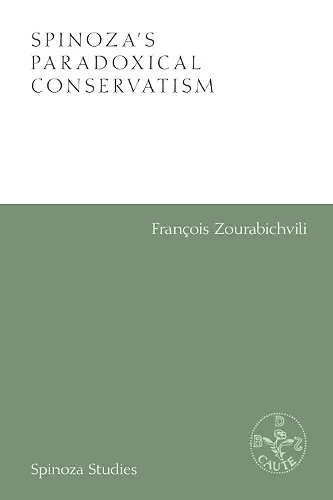Spinoza's Paradoxical Conservatism
Examining Spinoza's political theory and its implications
Francois Zourabichvili author Gil Morejon translator
Format:Hardback
Publisher:Edinburgh University Press
Published:18th May '23
Should be back in stock very soon

This insightful work explores Spinoza's political philosophy, offering a unique interpretation that challenges established traditions and engages with contemporary thought.
In Spinoza's Paradoxical Conservatism, Fran çois Zourabichvili presents a fresh perspective on Spinoza's political philosophy, diverging from traditional interpretations. The book is structured around three pivotal studies that delve into Spinoza's philosophical theory of change. Zourabichvili examines ethical transition, the significance of the infant in Spinoza's work, and the critique of absolute monarchy, which was prevalent during Spinoza's lifetime. This exploration not only highlights the nuances of Spinoza's thought but also positions it within the broader context of political theory.
The introduction of Spinoza's Paradoxical Conservatism serves as a comprehensive guide, situating Zourabichvili's work within the landscape of Spinoza scholarship. It outlines the major themes of his analysis and includes an engaging dialogue between Zourabichvili and Pierre Macherey, showcasing the depth of their intellectual exchange from 2004. This interaction enriches the reader's understanding of the complexities involved in interpreting Spinoza's ideas.
Zourabichvili, a notable student of Deleuze, brings a unique lens to his examination of Spinoza, making this book appealing not only to Spinoza scholars but also to those interested in contemporary French thought. The challenging and meticulously argued claims throughout Spinoza's Paradoxical Conservatism promise to engage anyone involved in political theory or early modern philosophy.
This book, the chef-d’oeuvre of a young philosophical genius, who left us in the prime of his life, offers a systematic interpretation of Spinoza’s ideas on monarchy and infancy, strangely associated, which by contrast reveal the tension between formation and death at the core of his "political ontology". It changed my understanding of Ethics and Theological-Political Treatise. * Etienne Balibar, author of Spinoza, The Transindividual *
In his interrogation on ethical transition, Zourabichvili highlights how Spinozism is a philosophy of transformation – and how such a transformation implements, paradoxically, the sense of: "to persevere in one's being". It thus allows us to reflect on the ultimate political question: what is a free multitude? * Pierre-François Moreau, L’Ecole Normale Supérieure de Lyon *
ISBN: 9781474489041
Dimensions: unknown
Weight: unknown
312 pages